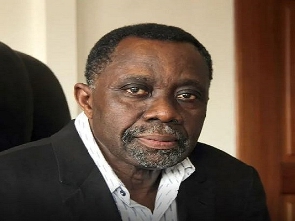 Dr. K.Y. Amoako, President and Founder-African Centre for Economic Transformation (ACET)
Dr. K.Y. Amoako, President and Founder-African Centre for Economic Transformation (ACET)
The country’s transformation has stalled despite experiencing rapid growth, including six years of exceptional growth between 2000 and 2020, Dr. K.Y. Amoako – President and Founder of the African Centre for Economic Transformation (ACET) – has said.
Despite periods of economic growth, he opined, the country’s development and economic transformation has been hindered by a lack of consistent long-term planning and high vulnerability to global markets and commodity-price shocks. This assessment was delivered by Dr. Amoako at the K.B. Amissah-Arthur [late Vice President of the Republic] Economic Forum at the Department of Economics, University of Ghana, in Accra.
“At the African Centre for Economic Transformation, we developed the African Transformation Index to track country progress in this regard. An updated index will be released this summer [by the end of September 2023], and it will show that Ghana’s economic transformation is in decline, below the African average in all the areas used to measure success; such as diversification of products and exports, technology and labour productivity,” Dr. Amoako stated.
The economy’s challenges have been further exacerbated by debt and energy crises, large trade and fiscal imbalances, and the lack of a cohesive long-term vision for sustainable growth.
Recognising the urgency required to address these issues, Dr. Amoako and a group of concerned citizens have spearheaded an initiative called the Compact for Ghana’s Political and Economic Transformation.
The Ghana Compact aims to “frame the future we want for Ghana by 2050” he explained, adding: “It is a platform for setting a shared vision for our nation that will tackle our greatest challenges. It is intended to put Ghana on a more secure path going forward by bringing a better balance to our democratic process and more voices into our policy discussions”.
The Compact sets out to engage citizens in policy discussions and empower the youth, women and civic associations to have a more significant say in shaping the country’s future. By creating a social contract between citizens and government, the initiative aims to achieve a long-term economic transformation that benefits all Ghanaians regardless of political affiliation.
“We all know the issues. Every time government changes, our policies and programmes change. Our constitution was written too long ago to work for today’s challenges. Women still face barriers to equal rights and equal participation. Our businesses are not as competitive as they could be. Our youth need skills, training and opportunities to succeed. And, of course, our fiscal health is weak,” stated Dr. Amoako.
The Ghana Compact is not just another diagnosis but a call to action that proposes concrete solutions, he emphasised. By involving ordinary citizens and a diverse group of stakeholders, he said, the initiative aims to deliver a well-informed blueprint for a more prosperous and sustainable country.
As the country approaches another election, the stakes are high. The decisions made by the next administration will shape Ghana’s trajectory for the next 25 years. The Ghana Compact seeks to create a true national consensus that addresses economic challenges while safeguarding democratic traditions and institutions.
Dr. Amoako emphasised that Ghana must draw lessons from successful transformation stories in other countries, such as South Korea and Malaysia, as well as on the African continent like Mauritius and South Africa. These countries’ experiences, he stated, demonstrate the importance of diversifying production and exports, improving competitiveness, boosting productivity, and upgrading technology to achieve successful economic transformation.
“We cannot squander this gift that we have. As I said earlier, the Black Star cannot wane,” Dr. Amoako passionately stated.
With the Ghana Compact, he is confident that the country will overcome its economic hurdles and set a course for sustainable growth and prosperity. The involvement of citizens – especially the youth, women and civic associations – signals a new era of inclusivity and collaboration in shaping Ghana’s future.
While the Compact may not provide all the answers, it offers a way forward, he said – reiterating the importance of learning from the past to ensure a better future for generations to come.
“We must learn from the past to ensure a better future for our children and for our grandchildren,” Dr. Amoako concluded.
Watch the latest edition of BizTech below: